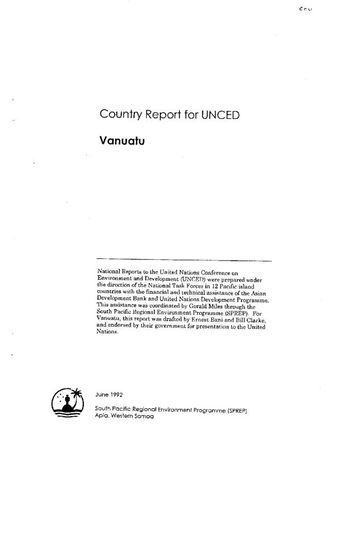Republic of Vanuatu : national conservation strategy = Vanuatu : Plan national pour l'Environnement
- Description:
- The traditional land tenure system and the customary rights to use land and sea resources are now part of the national constitution. All land in the Republic belongs to the custom owners and their descendants and rules of custom form the basis for ownership and use of both the land and off-shore resources. Within this system the chiefs played, and in most regions continue to play, an important role in regulating the use and management of natural resources for the benefit of the people they represent.
- Display date:
- 1993
- Collections:
- Secretariat of the Pacific Regional Environment Programme (SPREP)
- Publisher:
- Environment Unit, [Ministry of Environment]
- Content partner:
- Secretariat of the Pacific Regional Environment Programme (SPREP)
- Availability:
- Not specified
-
Copyright status: All rights reservedFind out more about what you are able to do with this itemThis item is all rights reserved, with means you'll have to get permission from Secretariat of the Pacific Regional Environment Programme (SPREP) before using it. For more information, please see our use and reuse page.What can I do with this item?Non-infringing useNZ copyright law does not prevent every use of a copyright work, and this item may be hosted by an international institute or organisation. You should consider what you can and cannot do with a copyright work.No sharingYou may not copy and/or share this item with others without further permission. This includes posting it on your blog, using it in a presentation, or any other public use.No modifyingYou are not allowed to adapt or remix this item into any other works.No commercial useYou may not use this item commercially.
Related items
Welcome and warm Pasifik greetings
The information on this site has been gathered from our content partners.
The names, terms, and labels that we present on the site may contain images or voices of deceased persons and may also reflect the bias, norms, and perspective of the period of time in which they were created. We accept that these may not be appropriate today.
If you have any concerns or questions about an item, please contact us.
